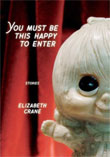|
You Must Be This Happy to Enter by Eliazbeth Crane Published by Punk Planet Books/Akashic 183 pages, 2008
|
Really, Really Slant Reviewed by Diane Leach
I had a mixed reaction to this book. Few writers today are offering stories with titles like “Sally (Featuring: Lollipop the Rainbow Unicorn)” or admitting, in the press materials enclosed with the book, that she wanted to focus on happiness, which, as literary topics go, is not too cool. Crane’s characters, to borrow Emily Dickinson’s term, are slant. Really, really slant. Take “Betty the Zombie,” a woman bitten by a zombie in a Minnesota Fabrics store. Betty’s zombiedom leads her to begin eating the neighbor’s pets, and in one case, a small child. In an effort to break this disconcerting habit (and not gobble husband Ed), Betty agrees to participate in a reality television show housing troubled women who work intensively with life coaches. Despite her disintegrating body and garbled zombie speech, Betty discovers her inner crafter, works through her zombie issues, and gets her very own reality telelvision show. You see what kind of book this is. The stories are amusing, very hip with their mentions of pit bulls and gentrification and the infant who alarms his parents one morning awakening as the fully formed Ethan Hawke. Reality television has a large role in the book, appearing in several stories as amusing, even important diversion. So: on the one hand, Crane is zanily inventive. On the other, will people pick up this book in 30 years and understand a word of it? If I had third hand, which I do not, I would add that maybe I am just an extremely grumpy middle-aged broad who is losing her sense of humor. Who prefers her books handle the deep subjects. Then again, it was a bad week. Jeff Healy died. So did Raymond Smith, Joyce Carol Oates’ husband of 46 years. So I didn’t open Happy feeling happy enough to enter. In fact, I felt like drinking, as Crane puts it, “a forty.” Crane is deft with zingers, like a couple of popular Aimee/Amys: Bender and Hempl. But where Hempl’s topics are unrelentingly miserable, Bender’s, like Crane’s, are simply strange. All the objects in “Clearview” become transparent, effectively paralyzing the townspeople. Words appear on a little girl’s forehead. A woman is able to reach into her television, removing and rearranging shows at will. Crane has a field day with the president. Consider this, from “Banana Love,” a meditation on married life:
In the title story, the main character, jailed for being illegally happy, tries to sadden herself in an effort to escape jail: “I came as near to crying as I ever have when I thought about the president being reelected...” (Many of us felt the same way.) Crane’s style is loose and surprisingly slangy -- my happy promo material informs me she is 46. Largely due to her sentence constructions, Crane’s writing doesn’t sound 46. Here again is “Sally (Featuring: Lollipop the Rainbow Unicorn.”
“My life is Awesome! And Great!” cites a “very trashy ho.” Mention is made of Forever 21, a store I have never set foot in (I’m younger than Crane, but not by much). In “Varieties of Loudness in Chicago,” “Once, he held your door when you found a sweet chair in the alley.” I confess I am so staid this sentence actually tripped me up for a minute. A sweet chair? My mind ran through various possibilities, finally coming up with the correct definition. I have a coworker that uses “sweet” as an adjective. She’s 25. Then again, the fact that I am dithering over my reaction to Happy is a good sign. If Crane’s book were bad, I’d be trying to write a politely scathing review. It’s not. It’s funny and timely and has some great moments, especially the final story, “Promise,” which is an open letter to the child the narrator hopes to adopt. My favorite in the collection is “What Happens when the Mipods Leave their Milieu.” The Mipods are devoutly into a religion that happily mashes Judeo-Christianity with Buddhism and a few other things. The Mipods believe in god (and this lower “g” god appears throughout the book, so don’t freak out at me, please), happiness, and leftist politics. Shane Mipod is moved to write the graphic novel Amen, which gets him hired in the Cross-Departmental Department of Prestimia College. He is flummoxed by this, a situation worsened when it emerges his fellow profs think Amen an ironic commentary on religion. Because my day job is in a place that could be Prestimia, I found Crane’s skewering of “interdisciplinary” academics, with their enormous egos and oft-ridiculous output, immensely entertaining. Ultimately, though, I am left wondering. How long can one write slant stories, how far can they slant, before they topple? | March 2008
Diane Leach lives in northern California with her husband and cat. She blogs at http://barkingkitten.blogspot.com. When not reading or writing, she regularly burns herself in the kitchen. |

